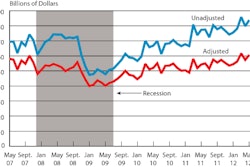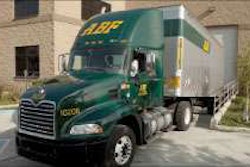Wi-Fi, GPS, EOBR and many other technology acronyms are part of our daily vernacular, so RFID probably needs no explanation. Chances are, you already use RFID in some form such as to bypass toll plazas and weigh stations, to cross international borders, track equipment, or count inventory as it is loaded and unloaded from trailers.
Because RFID technology is so widespread, it might be easy to overlook the additional ways it can be used to benefit motor carriers and their customers.
Intermec, a provider of rugged mobile computers, has a long history of developing RFID technology. Over the past 5 years, Intermec has seen the most traction for RFID technology in the tolling industry, but an international trend for using RFID to detect the status of vehicle registration may begin to catch traction in the states. Rather than using stickers on license plates, RFID can be used to identify the registration status of vehicles moving at highway speeds.
Some carriers may see a more immediate use for RFID to purchase fuel. Comdata announced that it is now processing live customer transactions via its cardless fueling technology. The first transaction occurred on July 31 at the Love’s Travel Stop in Pauls Valley, Okla.
The Comdata cardless system automates the fueling process and data entry requirements with the use of a cost-effective RFID tag. This allows drivers to spend less time at the pump and reduces the risk of fraudulent transactions by automatically shutting the fuel pump off when the truck pulls away. Comdata clients benefit from the same controls and limits that come with a physical Comdata Card when using the cardless system.
Another novel use for RFID is to track equipment assets and the larger and more expensive products that move through a supply chain. The smaller and more “conveyable” items are still a better fit for barcodes and barcode readers, says Jeff Sibio, Intermec’s industry marketing director for transportation and logistics.
Some companies, particularly private fleets, are equipping their vehicles with RFID systems that tie into onboard telematics devices. RFID readers on the vehicle can identify “tags” attached to cages, pallets or bins that carry individual products. As the cages are loaded or unloaded from the vehicle, the reader identifies the activity and, through integration with the onboard system, the company gets location, time and other details of the event.
The use of RFID readers and tags for product inventory is suited more for private fleets that operate with a consistent circle of customers, Sibio says. But a number of carriers, particularly in the less-than-truckload sector, are using RFID to keep track assets as they enter and leave their facilities. Through integration with the onboard system, the fleet can tag the exact location where a trailer is dropped in the yard.
The onboard system could include a handheld computer, such as Intermec’s CN70 device, that can communicate with an RFID tag on the equipment as well as an RFID reader at the location.











